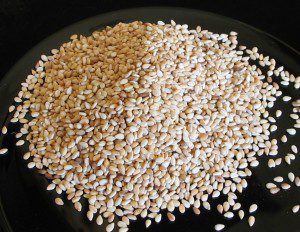By Sayer Ji
Contributing Writer for Wake Up World
Sesame (Sesamun indicum) is one of the oldest cultivated plants in the world, prized as an oilseed for at least 5,000 years. While it is beginning to regain favor due to its exceptionally high calcium and magnesium content, few realize it is also one of the most potent medicinal foods still commonly consumed today.
In fact, its history as a medicine goes back 3600 years to Egyptian times where it was listed in the scrolls of the Ebers as a favored medicine. Also, women in ancient Babylon were believed to use a mixture of honey and sesame seeds (havla) to prolong youth and beauty, and Roman soldiers ate the mixture for strength and energy.
[pro_ad_display_adzone id=”110028″]
In the past twenty years, a glut of scientific information has poured in demonstrating that sesame seed, and its components, have over three dozen documented therapeutic properties [see sesame research page]. Given these new revelations, it would seem that sesame would be just as at home in a medicine cabinet as it would be a kitchen cupboard.
Here are just 10 evidence-based medicinal properties of this food-medicine:
- Diabetes: A study published in 2011 in the Clinical Journal of Nutrition showed that sesame oil improved the effectiveness of the oral antidiabetic drug glibenclamide in type 2 diabetic patients. [1] Another study published in 2006 in the Journal of Medicinal Foods showed that the substitution of sesame seed oil as the sole edible oil lowers blood pressure and glucose in hypertensive diabetics. [2]
- High Blood Pressure: A study published in 2006 in the Yale Journal of Biological Medicine showed that sesame seed oil has a beneficial effect in hypertensive patients on either diuretics or beta-blockers. Substitution of all dietary oils with sesame oil brought down systolic and dystolic blood pressure to normal, in addition to decreasing lipid peroxidation (bodily rancidity) and antioxidant status. [3] One of the compounds identified behind sesame seed’s antihypertensive effects are peptides that act as angiotensin I-converting enzyme inhibitors.[4]
- Gingivitis / Dental Plaque: Sesame seed oil has been used for oral health for thousands of years in the traditional Indian medical tradition known as Ayurveda in a process known as “oil pulling.” It involves swishing sesame seed oil in the mouth for prolonged durations and has been said to prevent teeth decay, halitosis, bleeding gums, dry throat, and for strengthening the teeth, gums and jaw. Clinical research now confirms that it compares favorably to chemical mouthwash (chlorhexidine) in improving plaque-induced gingivitis, [5] and that it is capable of reducing Streptococcus mutans growth associated with oral plaque formation. [6]
- Infant Health/Massage Oil: A study published in the Indian Journal of Medical Research in 2000 showed that massaging infants with sesame oil improved both their growth and post-massage sleep, in comparison to control oils such as mineral oil.[7]
- Multiple Sclerosis (MS): In the animal model of MS, also known as experimental autoimmune encephalomyelitis, sesame seed oil protects mice from developing the disease by reducing IFN-gamma secretion, a key factor in initiating autoimmune inflammation and injury in the nervous system.[8] It has also been research for its potential beneficial role in another neurodegenerative condition, Huntington’s disease. [9]
- Antibiotic-Induced Kidney Damage: Sesame seed oil protects against gentamicin-induced kidney damage in rats by reducing oxidative damage caused by the antibiotic. [10]
- Atherosclerosis: Sesame seed oil prevents the formation of atherosclerotic lesions in mice fed an atherogenic diet. [11] The antioxidant and anti-inflammatory lignan found within sesame seeds known as sesamol has been identified to be partially responsible for its anti-atherogenic properties. In fact, sesamol has been shown to possess over two dozen beneficial pharmacologically active properties, many of which may contribute to improving cardiovascular health.
- Depression: The sesame lignin sesamol was shown to exert an antidepressant-like effect in behavioral despair in chronically stressed mice, specifically by modulating oxidative-nitrosative stress and inflammation. [12]
- Radiation-Induced DNA Damage: Sesamol has been shown to protect against gamma radiation-induced DNA damage, likely through its antioxidant properties. [13] It is capable of reducing mortality in radiation treated mice, in part through preventing intestinal and spleen damage. [14] When compared to another powerful antioxidant, melatonin, it was found 20 times more effective as a free radical scavenger. [15]
- Cancer: Sesame contains a fat-soluble lignin with phytoestrogenic properties known as sesamin, and which has been studied for inhibiting the proliferation of a wide range of cancer cells, including:
- Leukemia
- Multiple Myleoma
- Colon Cancer
- Prostate Cancer
- Breast Cancer
- Lung Cancer
- Pancreatic Cancer
- Lung Cancer
Sesamin’s anticancer effects have been linked to the NF-kappaB signaling. [16]
Sesame deserves to be recognized, along with garlic, honey, turmeric and a select few other substances, as an easily accessible and affordable food-medicine that, if consumed regularly, could quite possibly save lives.
[1] Sesame oil exhibits synergistic effect with anti-diabetic medication in patients with type 2 diabetes mellitus. Clin Nutr. 2011 Jun ;30(3):351-8. Epub 2010 Dec 16. PMID: 21163558
[2] A pilot study of open label sesame oil in hypertensive diabetics. J Med Food. 2006 Fall;9(3):408-12. PMID: 17004907
[3] Effect of sesame oil on diuretics or Beta-blockers in the modulation of blood pressure, anthropometry, lipid profile, and redox status. Yale J Biol Med. 2006 Mar;79(1):19-26. PMID:17876372
[4] Antihypertensive effect of angiotensin I-converting enzyme inhibitory peptides from a sesame protein hydrolysate in spontaneously hypertensive rats. Biosci Biotechnol Biochem. 2006 May;70(5):1118-26. PMID: 16717411
[5] Effect of oil pulling on plaque induced gingivitis: a randomized, controlled, triple-blind study. Indian J Dent Res. 2009 Jan-Mar;20(1):47-51. PMID: 19336860
[6] Effect of oil pulling on Streptococcus mutans count in plaque and saliva using Dentocult SM Strip mutans test: a randomized, controlled, triple-blind study. J Indian Soc Pedod Prev Dent. 2008 Mar;26(1):12-7. PMID: 18408265
[7] Effects of massage&use of oil on growth, blood flow&sleep pattern in infants. Indian J Med Res. 2000 Dec;112:212-7. PMID: 11247199
[8] The Mechanism of Sesame Oil in Ameliorating Experimental Autoimmune Encephalomyelitis in C57BL/6 Mice. Phytother Res. 2011 Apr 28. Epub 2011 Apr 28. PMID: 21538630
[9]Sesamol attenuate 3-nitropropionic acid-induced Huntington-like behavioral, biochemical, and cellular alterations in rats. J Asian Nat Prod Res. 2009 ;11(5):439-50. PMID: 19504387
[10] Protective effect of daily sesame oil supplement on gentamicin-induced renal injury in rats. Biol Pharm Bull. 2001 Feb;24(2):181-7. PMID: 19487986
[11] Inhibition of atherosclerosis in low-density lipoprotein receptor-negative mice by sesame oil. J Med Food. 2006 Winter;9(4) PMID: 17201634
[12] Neuropsychopharmacological effect of sesamol in unpredictable chronic mild stress model of depression: behavioral and biochemical evidences. Psychopharmacology (Berl). 2011 Apr ;214(4):819-28. Epub 2010 Nov 20. PMID: 21103863
[13] Antioxidant potential of sesamol and its role on radiation-induced DNA damage in whole-body irradiated Swiss albino mice. Environ Toxicol Pharmacol. 2009 Sep ;28(2):192-7. Epub 2009 Apr 11. PMID: 21784002
[14] Effect of sesamol on radiation-induced cytotoxicity in Swiss albino mice. Mutat Res. 2006 Dec 10 ;611(1-2):9-16. Epub 2006 Oct 11. PMID: 17045515
[15] Sesamol as a Potential Radioprotective Agent: In Vitro Studies. Radiat Res. 2011 Sep 7. Epub 2011 Sep 7. PMID: 21899433
[16] Sesamin manifests chemopreventive effects through the suppression of NF-kappa B-regulated cell survival, proliferation, invasion, and angiogenic gene products. Mol Cancer Res. 2010 May;8(5):751-61. Epub 2010 May 11. PMID: 20460401
About the Author
Sayer Ji is the founder and chair of GreenMedInfo.com. His writings and research has been published in the Wellbeing Journal, the Journal of Gluten Sensitivity, and have been featured on Reuters, Mercola.com, NaturalNews.com, Infowars.com, GaryNull.com, Care2.com. His critically acclaimed essay series The Dark Side of Wheat opens up a new perspective on the universal, human-species specific toxicity of wheat, and is now available for PDF download.
[pro_ad_display_adzone id=”110027″]
Disclaimer: This article is not intended to provide medical advice, diagnosis or treatment. Views expressed here do not necessarily reflect those of Wake Up World or its staff.







